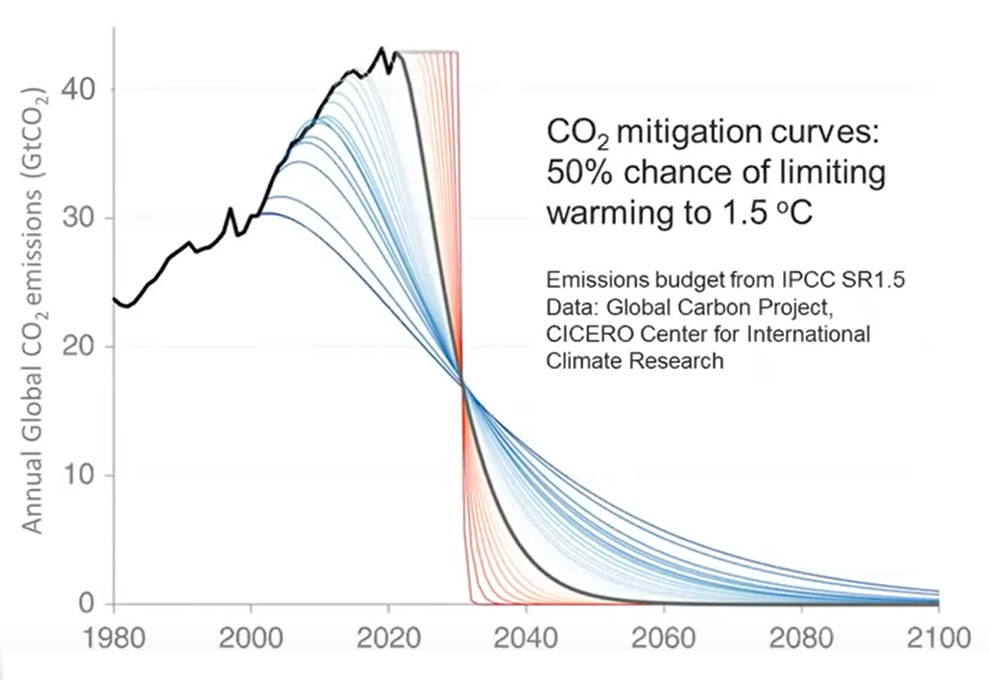
Climate science briefing for MPs by Patrick Vallence et al was seriously misleading
In 2022, an online briefing was given by Patrick Vallence (UK Government Chief Scientist) and other speakers.
The stated aim was to brief UK MPs on climate science.
However the briefing was seriously flawed by inconsistency, omissions and errors.
The worst inconsistency was between (a) pointing out that the world's carbon budget for 1.5°C runs out in about 2031, which indicates the need for urgent radical change over the next few years, and (b) the portraying as adequate of the UK's Net Zero 2050 strategy of gradual reduction in CO2 emissions to zero in 2050.
A major omission was that there was no mention of the UK's commitment to equity between nations in the Paris Agreement, which means that the UK's CO2 emissions should be cut much faster than the global average, making radical change even more urgent.
The result is that the briefing, which is still available online, is seriously misleading MPs, other decision makers, and the wider public, and is contributing to the widespread climate complacency and denial.
It should be replaced by a briefing for MPs that is in line with the science, and the UK's international commitments.
The briefing
In July 2022, and online briefing was given by- Patrick Vallance (UK Government Chief Scientific Adviser)
- Prof Stephen Belcher (Met Office)
- Prof Emily Shuckburgh (Cambridge Zero)
- Prof Gideon Henderson (Chief Scientific Adviser at the UK Department for Environment, Food and Rural Affairs)
The stated aim was to brief UK MPs on climate science. It was hosted by the UK All-Party Parliamentary Climate Change Group together with Peers for the Planet, and was chaired by Caroline Lucas MP.
The briefing is available online [1].
Major inconsistency with the climate science
The scientific consensus on the urgency of the climate emergency was referred to in the introductory remarks from Caroline Lucas, which included a quote from the IPCC:"The scientific evidence is unequivocal: climate change is a threat to human wellbeing and planetary health. Any further delay in adaptation and mitigation will miss a brief and rapidly closing window of opportunity to secure a liveable future for all"
 The urgency of action was also shown during the briefing by Stephen Belcher's slide (at 19:25) which reproduced the CICERO chart of possible emission reduction pathways, which is also reproduced here. The chart shows that the residual carbon budget for limiting global warming to 1.5°C will run out in 2031 at current emission rates - which is much sooner than the 2050 date of the UK's Net Zero 2050 strategy.
The urgency of action was also shown during the briefing by Stephen Belcher's slide (at 19:25) which reproduced the CICERO chart of possible emission reduction pathways, which is also reproduced here. The chart shows that the residual carbon budget for limiting global warming to 1.5°C will run out in 2031 at current emission rates - which is much sooner than the 2050 date of the UK's Net Zero 2050 strategy.And yet, Stephen Belcher said (at 18:20) "to keep below 1.5° above the pre-industrial temperature, which is the Paris Agreement, ... there's not much more [CO2] that we can put in the atmosphere ... probably 20 to 30 years at the current rate of emissions, maximum". The time to when the global carbon budget runs out at current emission rates (c2031) is such a basis part of planning for the climate emergency that it is extraordinary that Stephen Belcher should give an impression that it is 20 to 30 years away. It is also extraordinary that the other speakers did not correct him. This error inevitably promotes climate complacency and denial, and it was compounded by other speakers similarly implying that there is little urgency of action.
Omission of equity between nations
A major omission in the briefing was that there was no mention of the UK's commitment to equity between nations, which is a part of the Paris Agreement, and which means that theUK's CO2 emissions should be cut much faster than the global average
, making radical change even more urgent. It is extraordinary that this commitment to emission reduction in the UK faster than the global average was not mentioned by any of the speakers. The effect of the commitment is that the UK's fair share of the global carbon budget runs out even sooner at current emission rates than the 2031 date for the global carbon budget - the date is around 2025-2027, depending on assumptions. The briefing speakers should have referred to the key UK academic sources on when the UK carbon budget runs out [2][3], which give an indication of the extreme urgency of action.
Errors
The errors in the briefing include the portrayal of the UK Government's Climate Change Committee as independent. It is not independent - its members are appointed by the UK Government.Conclusions
The briefing is seriously misleading. The end result is to promote climate complacency and climate denial.The briefing should be replaced by one that is in line with the science and the UK's international commitments.
This is yet another example of the widespread climate urgency denial that exists in the UK Government and across all sections of society. The briefing shows again the need for a group of people who are willing to convey the science accurately, together with the implications of urgent radical change in all section of society, and who are willing to challenge those who are not.
References
| [1] | Sir Patrick Vallance briefs MPs on climate science (2022) https://www.youtube.com/watch?v=kXQ46R15e1c |
| [2] | https://cusp.ac.uk/wp-content/uploads/WP-29-Zero-Carbon-Sooner-update.pdf |
| [3] | https://carbonbudget.manchester.ac.uk/reports/ |
Started: 18 Apr 2025

 ✖
✖